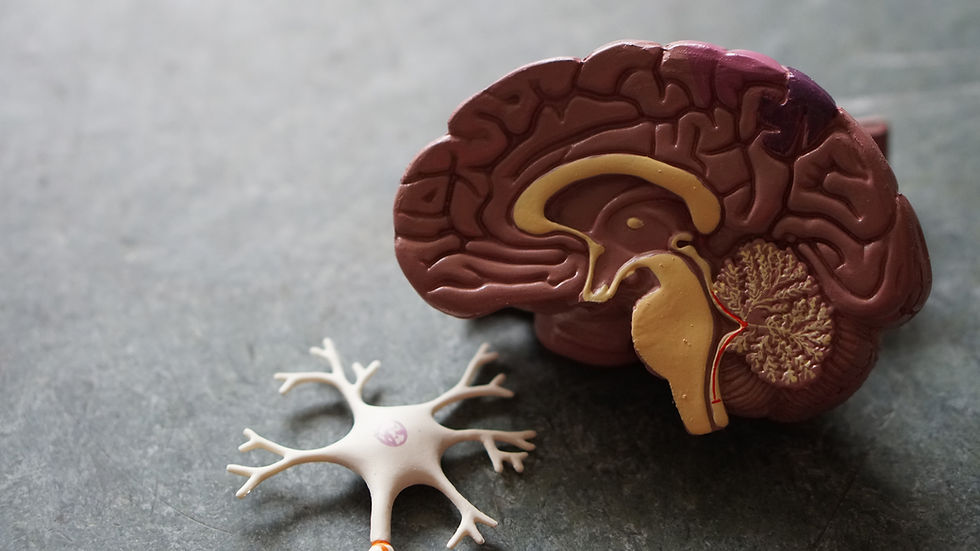Exploring Depression: How Your Gut and Microbes Impact Mental Health
- Dr. Todd Farney

- Apr 2, 2024
- 4 min read
Updated: Feb 26, 2025
In the realm of functional health, we're uncovering just how interconnected our bodily systems truly are. While depression has traditionally been seen as a purely neurological issue, recent research suggests a much broader perspective.
We're finding that gut health, the presence of specific microbes like Lyme bacteria and fungi, and the gut-brain axis all play significant roles in mental well-being.
Let's dive into this fascinating topic and shed some light on the connections between depression, gut health, and microbes.
The Gut-Brain Axis: A Bi-Directional Communication Highway

Think of the gut-brain axis as a two-way street where information flows freely between your digestive system and your central nervous system.
This communication highway allows neurotransmitters, inflammatory markers, and other signaling molecules to influence mood, cognitive function, and overall brain health.
While we've long understood that our emotions can affect our gut—ever felt butterflies in your stomach when nervous?—we now know that the reverse is also true. The state of our gut can significantly impact our mental state.
Microbes: The Mood Architects in Your Gut
Our gut is home to trillions of microorganisms—bacteria, viruses, and fungi—that collectively form the microbiota. Any disruptions to this delicate ecosystem, whether through diet, stress, or infection, can have profound effects on our mental health.
Lyme Disease and Depression: The bacteria responsible for Lyme disease, Borrelia burgdorferi, can wreak havoc on both body and mind. While joint pain and fatigue are well-known symptoms, depression is often overlooked. This bacterium can trigger inflammation, which may worsen depressive symptoms.
Fungi's Impact on Mental Health: Certain fungi, like Candida species, when overgrown, can compromise gut health, leading to a condition known as "leaky gut." This increased permeability allows harmful toxins and inflammatory compounds to enter the bloodstream, potentially contributing to depressive states.

The Gut's Surprising Role in Neurotransmitter Production
Here's an eye-opener: Your gut isn't just for digestion—it's also a major player in producing neurotransmitters, the brain chemicals that regulate mood.
Surprisingly, over 90% of serotonin, often dubbed the "feel-good" neurotransmitter, is manufactured in the gut. Disruptions in the gut microbiota, whether due to Lyme, fungi, or other factors, can disrupt the production and function of these crucial chemicals.
Taking a Holistic Approach to Depression
Given these intricate connections, it's clear that tackling depression requires more than just a brain-focused approach. Functional health offers a holistic view that encompasses the entire body.
Comprehensive Testing: In addition to standard depression assessments, functional health practitioners delve deeper, examining gut health, checking for infections like Lyme, and assessing fungal overgrowths. Advanced techniques like direct resonance testing provide even more insights into your body's functioning.
Tailored Treatments: Functional health treatments are personalized to address your specific needs. This might involve dietary changes to support gut health, probiotics to restore microbial balance, or targeted therapies to combat Lyme or fungal infections.
Prioritizing Gut Health: At the heart of functional health is the understanding that a healthy gut is essential for overall well-being. By addressing gut health, we can make significant strides in managing and treating depression.

Depression is no longer viewed as a simple brain disorder but rather a complex interplay between various bodily systems. The gut-brain axis serves as a crucial link between gut health and mental state, highlighting the profound impact of microbes on our well-being.
While seeking the root cause of depression, it's vital to maintain open communication with your healthcare providers. If you experience severe or prolonged depressive episodes, don't hesitate to seek immediate medical attention.
Functional health embraces this complexity, advocating for integrated and holistic approaches to depression that prioritize gut health, microbial balance, and overall well-being.
As our understanding evolves, so too do our treatment options, paving the way for a brighter, more holistic approach to mental health.
Ready to take control of your mental health and explore the intricate connections between your gut, microbes, and depression? Book an appointment with Dr. Todd Farney at Functional Health Solutions today!
Let's work together to uncover the root causes of your depression and develop personalized strategies for optimal health and happiness. Your brighter future awaits—take the first step today!
References:
1. Carabotti, M., Scirocco, A., Maselli, M.A., & Severi, C. (2015). The gut-brain axis: interactions between
enteric microbiota, central and enteric nervous systems. Annals of Gastroenterology, 28(2), 203–209.
2. Bransfield, R.C. (2018). Neuropsychiatric Lyme Borreliosis: An Overview with a Focus on a Specialty
Psychiatrist’s Clinical Practice. Healthcare, 6(3), 104.
3. Kim, J., Sudbery, P. (2011). Candida albicans, a major human fungal pathogen. *Journal of
Microbiology*, 49(2), 171-177.
4. Yano, J.M., Yu, K., Donaldson, G.P., et al. (2015). Indigenous bacteria from the gut microbiota regulate
host serotonin biosynthesis. Cell, 161(2), 264–276.
Disclaimer: This blog is provided for informational purposes only and is not intended as medical advice. The content shared here is meant to enhance your understanding of health-related topics, but it should not replace professional medical advice, diagnosis, or treatment. Always consult your healthcare provider or a qualified medical professional with any questions you may have regarding a medical condition or health objectives. Reliance on any information provided in this blog is solely at your own risk.




Comments